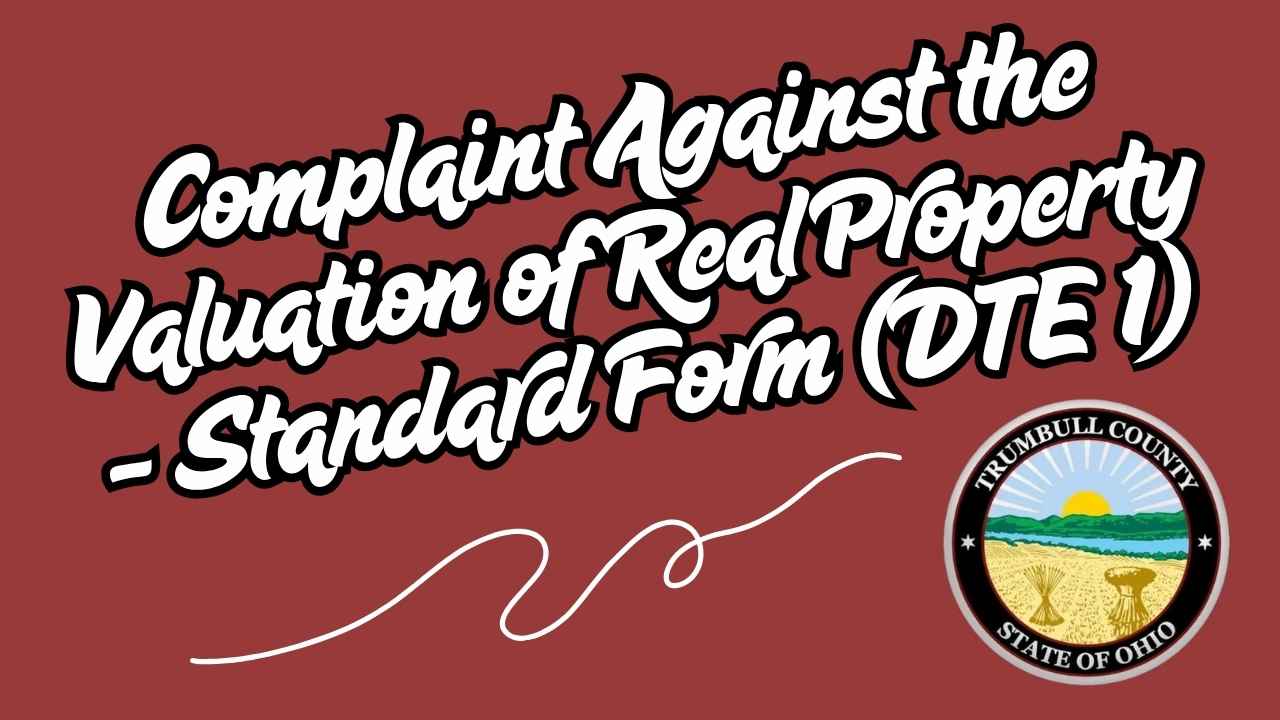If you think your property in Trumbull County, Ohio, is overvalued for taxes, you can file a complaint. Use the Standard Form DTE 1 to start a legal challenge through the Trumbull County Board of Revision (BOR). This could lead to lower property taxes. This guide will help you through the process, including recent updates and best practices.
Preparing well is key to a successful complaint. This guide is for homeowners, business owners, or anyone representing a property. It covers everything from understanding the DTE 1 form to the Board of Revision hearing.
What is the DTE 1 Form?
The DTE 1 form is for challenging the county auditor’s property value in Trumbull County. It helps ensure your property’s taxable value is fair. This affects how much you pay in property taxes.
When you file a DTE 1, you must prove your case. The Trumbull County BOR reviews these complaints. They decide if the property value should be adjusted.
Why File a DTE 1 Complaint?
Property values in Trumbull County are updated every three years and every six years. The 2023 reappraisal changed tax bills for 2024. If you think your property value is too high, filing a DTE 1 can help lower your taxes.
Common reasons to file include:
- Overvaluation: The value is higher than the market price.
- Data Errors: Mistakes in property details.
- Market Changes: Changes in the local market not reflected in the value.
- Physical Changes: Changes to the property not considered in the assessment.
Who Can File a DTE 1 Complaint?
In Trumbull County, you can file a DTE 1 complaint if you are:
- A property owner or their spouse.
- A professional like a real estate appraiser or accountant.
- An officer or employee of a company owning the property.
You must explain your connection to the property and provide contact info. This ensures the BOR can reach you.
Filing Deadlines and Recent Updates for 2025
The filing period for DTE 1 complaints in Trumbull County starts January 2, 2025 and ends March 31, 2025. You must file by March 31 or the first half tax deadline. A postmark or County Auditor’s stamp proves you filed on time.
Recent changes to the DTE 1 process include:
- Electronic Filing Option: Now, you can file complaints online through the Trumbull County Auditor’s website. This way, you don’t need a notary if you submit it digitally.
- 2023 Reappraisal Impact: The 2023 reappraisal by contracted appraisers has led to big changes in property values. This is because of the rising market values, causing more people to file complaints.
- Informal Hearings: From October 30 to November 3, 2023, you can have informal hearings. These are to discuss the 2023 values before you formally file. But, these hearings don’t replace the DTE 1 process.
How to File a DTE 1 Complaint in Trumbull County
Filing a DTE 1 complaint has several steps. Here’s a detailed guide to help you follow the rules and increase your chances of success.
Step 1: Obtain the DTE 1 Form
The DTE 1 form is available in two ways:
- Digital Form: You can download it from the Trumbull County Auditor’s website (auditor.co.trumbull.oh.us) or the Ohio Department of Taxation website (tax.ohio.gov).
- Standard Form: You can get it in person at the Trumbull County Auditor’s Office or by calling (330) 675-2420.
Make sure to use the latest version of the form, updated for 2025. This will help avoid any issues.
Step 2: Complete the Form Accurately
The DTE 1 form needs specific information, including:
- Owner of Record: The name of the property owner as shown on the deed.
- Parcel Number: The unique number for the property, found on tax bills or the auditor’s website.
- Complainant’s Information: Your name, how you’re related to the property, and your contact details.
- Opinion of Value: Your suggested fair market value, backed by evidence.
- Reason for Complaint: A clear reason why you think the current valuation is wrong.
If you’re filling out the form by hand, it needs to be notarized. But, if you’re submitting it digitally, it doesn’t need a notary. Just make sure it’s complete and accurate.
Step 3: Gather Supporting Evidence
You need to prove that the assessed value is wrong. Good evidence is key to a successful complaint. Acceptable evidence includes:
- Recent Sales Data: Documents like purchase agreements, closing statements, or HUD-1 forms for the property or similar ones.
- Appraisal Reports: A 2023 or 2024 appraisal by a certified appraiser for tax purposes, with the appraiser ready to testify.
- Income and Expense Statements: For properties that make money, provide detailed financial data for the tax year and two years before.
- Property Condition Documentation: Photos, repair estimates, or records of any changes to the property (like damages or demolitions).
Step 4: Submit the Complaint
After filling out the DTE 1 form and gathering evidence, submit it to the Trumbull County Auditor’s Office by March 31, 2025. You can do this in a few ways:
- In-Person: At 160 High Street NW, Warren, OH 44481.
- Mail: Send it via certified mail to prove you filed it.
- Email: If you’re submitting a digital form, you can email it through the auditor’s website.
If your contact information changes after filing, update it. This way, you won’t miss any BOR notices.
Step 5: Prepare for the Board of Revision Hearing
After filing, the BOR will set a hearing date. This can last 15 minutes for homes and 20-30 minutes for businesses. Key points:
- Hearing Process: The person who filed will share their case. This includes evidence and their story. Witnesses are sworn in, and everything is recorded.
- Attendance: It’s best to be there to answer questions. If you’ve submitted an appraisal, the appraiser must be there too.
- Rescheduling: You can ask for one reschedule for a good reason. But, asking again might mean your case is dismissed.
The BOR might change the value, keep it the same, or raise it based on what you provide.
Step 6: Await the Decision
The BOR usually makes a decision in 2-3 weeks. They send it by certified mail or email. If they agree, the new value will be used for that year and maybe the next. If they say no, you can appeal to the Ohio Board of Tax Appeals within a short time.
Key Considerations for a Successful DTE 1 Filing
To make your case stronger, remember these tips:
- Accuracy is Critical: If your form is wrong or missing info, it might get thrown out. Make sure everything is right before you send it.
- Evidence is King: The BOR looks at your evidence a lot. This could be recent sales or appraisals to show the property’s value.
- Legal Representation: You don’t have to have a lawyer or appraiser. But, they can help, even with tricky cases.
- Understand Limitations: The BOR can change property values. But, they can’t change tax rates or how much you pay in taxes. Those are set by voters.
Common Evidence for DTE 1 Complaints
| Type of Evidence | Description | Use Case |
|---|---|---|
| Arms-Length Sale Documentation | Things like a deed, HUD-1 statement, or purchase contract from a recent sale. | It shows the market value by proving a sale happened. |
| Certified Appraisal Report | A 2023/2024 appraisal by a licensed appraiser for tax purposes. | It helps show the property’s fair market value. |
| Income/Expense Statements | Financial info for properties that make money, like rent rolls and expenses. | It supports the value of commercial properties. |
| Property Condition Records | Photos, repair estimates, or records of damage or improvements. | It helps fix mistakes in property records. |
Trumbull County Valuation Process: How It Works
The Trumbull County Auditor’s Office updates property values every three years. This is because of Ohio Revised Code (ORC) Section 5713.01. Here’s how it works:
- Triennial Updates: Values are updated every three years to keep up with the market.
- Sexennial Reappraisals: Every six years, there’s a big update. The last one was in 2023.
- Market-Based Valuation: Values are based on recent sales, location, and property details like size and condition.
The 2023 reappraisal looked at every property’s outside. This led to big increases in value because of a strong market. Property taxes are based on 35% of the appraised value.
Impact of Valuation Changes on Property Taxes
The BOR adjusts property values but doesn’t control tax rates. Tax rates are set by voter-approved levies and inside millage (up to 10 mills). A successful DTE 1 complaint can lower your assessed value, reducing your tax bill. Yet, tax increases can happen due to new levies or changes in inside millage.
For example, if your property’s assessed value drops from $200,000 to $180,000, and the tax rate is 50 mills, you save:
- Original Tax: $200,000 × 0.35 × 0.050 = $3,500
- New Tax: $180,000 × 0.35 × 0.050 = $3,150
- Savings: $3,500 – $3,150 = $350 per year
Comparison of DTE Forms for Property Complaints
| Form | Purpose | When to Use |
|---|---|---|
| DTE 1 | Complaint against the valuation of real property based on market value. | To challenge overvaluation or errors in market value. |
| DTE 1A | Special COVID-19-related complaint for valuation issues (2020-2022 only). | For pandemic-related valuation disputes (expired). |
| DTE 1M | Complaint against the valuation of manufactured or mobile homes. | For mobile homes taxed as real property. |
| DTE 2 | Complaint against assessment issues other than market value. | For non-market value disputes (e.g., classification errors). |
Tips for a Successful BOR Hearing
- Be Prepared: Organize your evidence clearly and practice presenting your case concisely.
- Bring Documentation: Submit all evidence at least five days before the hearing or bring copies to the hearing.
- Know Your Property: Be ready to discuss specific details, such as recent improvements or damages.
- Consider Professional Help: A certified appraiser or attorney can provide expert testimony to strengthen your case.
Case Study: A Successful DTE 1 Filing in Trumbull County
In 2023, a Trumbull County homeowner noticed their property’s assessed value increased by 30% after the mass reappraisal, despite no significant improvements. They filed a DTE 1 complaint, supported by a 2023 appraisal showing a lower market value and sales data from comparable homes in their neighborhood.
At the BOR hearing, the homeowner presented their evidence, and the appraiser testified to the report’s accuracy. The BOR reduced the assessed value by 15%, saving the homeowner approximately $400 annually in taxes.
This case highlights the importance of strong evidence and thorough preparation.
Frequently Asked Questions About DTE 1 Complaints
What Happens if My Complaint is Denied?
If the BOR denies your complaint, you can appeal to the Ohio Board of Tax Appeals within 30 days. Consult an attorney to ensure compliance with appeal deadlines and requirements.
Do I Need a Lawyer to File a DTE 1 Complaint?
No, but legal representation can be beneficial, for commercial properties or complex cases. Most residential owners file without an attorney, but they must provide sufficient evidence.
Can I File More Than One Complaint in a Triennial Period?
Generally, only one complaint per parcel is allowed per triennial period unless significant changes (e.g., new construction or damage) occur.
How Can I Check My Property’s Assessed Value?
Visit the Trumbull County Auditor’s website at property.co.trumbull.oh.us. Search by address or parcel number to see your property’s current value.
Take Control of Your Property Valuation
Filing a DTE 1 complaint in Trumbull County is a great way for property owners to ensure fair tax values. Follow the steps in this guide to prepare for the BOR hearing. The 2025 filing season is coming, so start preparing now to meet the March 31 deadline.
Have you checked your property’s assessed value recently? Share your experience or questions in the comments below. Or, contact the Trumbull County Auditor’s Office for help. Taking action today could save you hundreds on your next tax bill.
Sources:
- Trumbull County Auditor’s Office: auditor.co.trumbull.oh.us
- Ohio Department of Taxation: tax.ohio.gov
- TemplateRoller: www.templateroller.com




